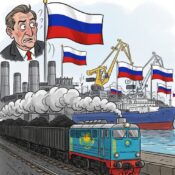The Russian Western Perimeter
Russia's geopolitical narrative has, for centuries, been defined by the sheer length and vulnerability of its western borders. Currently, the land border Russia shares with Western-aligned states, including those in the Baltic and Eastern Europe, stretches for thousands of kilometers. Pinpointing an exact, static figure is difficult due to shifting political landscapes and disputed territories, but it's safe to say we're dealing with a vast, complex frontier.
This sprawling perimeter is not just a geographical fact; it's the crux of Russia's security anxieties. Historically, Russia has perceived its western flank as a corridor for invasion. From the Teutonic Knights to Napoleon and Hitler, the plains of Eastern Europe have witnessed countless armies marching eastward. This historical trauma has deeply ingrained a defensive mindset.
The solution, in the Russian view, has consistently been expansion. Why? Because a shorter, more defensible perimeter reduces vulnerability. This is the core logic behind the historical expansion of the Russian Empire and, later, the Soviet Union. By incorporating buffer zones and satellite states, Russia sought to create a strategic depth that would absorb any potential attack.
The Soviet Union, at its peak, epitomized this approach. The Warsaw Pact states acted as a massive forward defense, pushing the effective border far west. This created a sense of security, albeit one built on ideological control and military might. The collapse of the Soviet Union shattered this buffer, leaving Russia with a significantly contracted and exposed western border.
This contraction, in the eyes of Russian strategists, reinstated the historical vulnerability. The eastward expansion of NATO, incorporating former Soviet satellite states, further exacerbated these anxieties. From a Russian perspective, it recreated the very threat the Soviet Union was designed to prevent.
Therefore, the current geopolitical tensions are not merely about ideology or personal ambitions. They are rooted in a deep-seated, historically informed security imperative. For Russia, securing its western border is not a matter of choice; it's a matter of survival. The desire to control or influence neighboring states, to create that buffer once again, is a direct consequence of this perceived vulnerability. The vastness of the western outer border, and the historical lessons learned on that border, continue to drive Russian geopolitical behavior.



